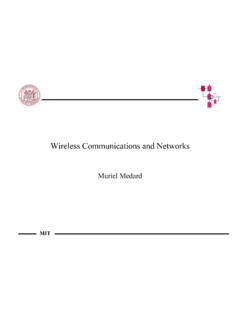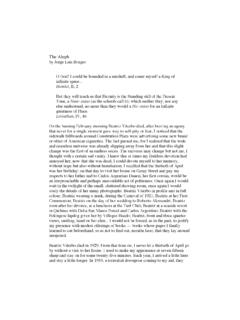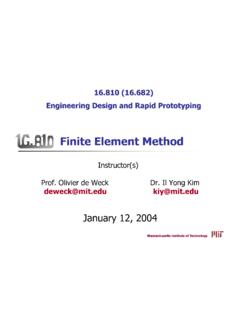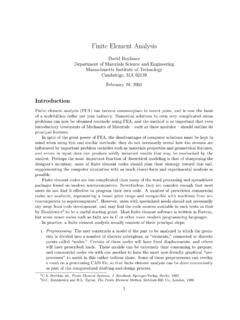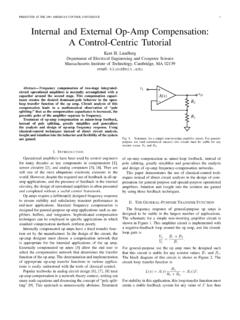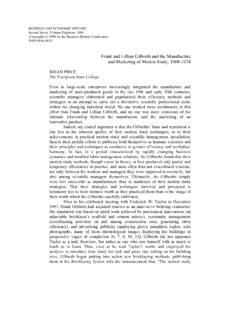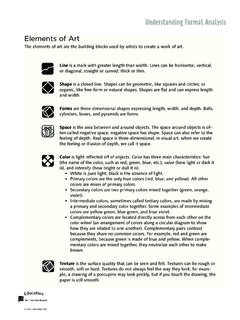Transcription of EPIC THEATRE - Massachusetts Institute of Technology
1 From miscellaneous WWW sources Bertolt brecht 1898-1956 EPIC THEATRE using Verfremdungseffekt (AKA the V-effect, Making strange, Distancing, Alienation) The actor is not Lear He shows Lear. Verfremdungseffekt: through Fixing , Gest, Spass, and Multimedia brecht was against naturalistic THEATRE where the audience hang up their brains with their hats in the cloakroom. The V-effect is to make the spectator adopt an attitude of inquiry and criticism in his approach to the incident. No attempt is made to put the stage (and the audience) in a trance.
2 Everyday Examples of the V-Effect: Witnesses of an accident demonstrating to newcomers how the victim behaved, a facetious person imitating a friend's walk .. Stage Example: Chinese THEATRE Aids to achieve this technique: 1. Transposition into the third person. 2. Transposition into the past. 3. Speaking the stage directions out loud. Addressing the audience direct as both actor and character. Stage purged from anything magical Use of half curtains Making visible the sources of light Using signs at the start of scenes Fixing From the first rehearsals, the Cast forms opinions of the incidents or characters they are playing.
3 For what social purpose they are performing this particular historical event. These opinions, once fixed , then determine the acting style for each character and event. Gest Gesture with attitude . To be able convey the intentions of the performance Either by the whole picture, a single gesture or voice inflection Example of Gest: Gesture= Soldiers marching across a stage. Gest= Soldiers marching over wounded and dead across a stage Spass Fun / Stereotypes. The audience is being invited to laugh at these characters and ultimately condemn what they stand for.
4 (In rehearsal, to find a stereotype; explore the character from the outside-in.) Two Acting Styles co-existing Grotesque contrasted with Sympathetic down-to-earth characters (both are making political statements to the audience and one shows up the other) Multi-media brecht believed in using Acting, Dance, Music, Song, Mask, Chorus, Signs & film Not Combined, but Montaged in their own right. ---------------------------------------- ---------------------------------- brecht 'S EPIC THEATRE IN DETAIL ACTING, DESIGNING, PLAYWRIGHT, LIGHTING, DIRECTING, COMPOSING Epic Acting Demonstrates rather then imitates past tense.
5 Stage directions Gestures used to indicate inner feelings- stage pictures preparation of characters on stage address the audience characters given titles- characters representative external acting physicality- gesture used to indicate inner feelings ensemble swap roles to evaluate characters Epic Designer dispense with illusion and symbolism no 'fourth wall' minimal props set change in view of audience one prop per person- representative using half curtains Epic Playwright structured episodically awareness of events in the past tell audience through labels use of cue cads to reinforce- fill in missing link socialist message prevailed use of parable clear one sided message 'anti illusive techniques- flash back, missing time Epic Lighting The lighting director in Epic THEATRE needs to abandon the idea of hiding sources of light to achieve a mysterious effect to draw the audience into the action.
6 brecht flooded the stage with 'harsh white light', regardless of where the action was taking place and leaving the stage lamps in full view of the audience. Obvious lighting constantly reminds the audience they are watching a play. Epic Director An Epic director decides the blocking for the actor, which is done not for formal beauty. brecht wanted directors to block so it clarifies the structure of the human relationships in the play. brecht wanted to use everything on the stage to make the audience develop a more critical attitude. Epic composer The composer in Epic THEATRE is very important as brecht intentionally interrupts the action at 'key junctures', with songs to get the message across.
7 The composer should express his ideas of the plays themes independently and provide a separate comment on the action about themes and ideas. Music helps distance the audience by not reinforcing the text but to provide a counterpoint to the action on the stage. The words and tunes clash which draws attention to the words. Aims (two essentials).. The message must be clear The audience must remain critically aware brecht and Artaud brecht and Artaud basic facts and differences brecht brecht started influencing THEATRE after World War II. Emphasis on theatricality.
8 Spectator participates productively. Ask questions. The social problem addressed should not be resolved in the THEATRE , but people should be inspired to go out and solve it. From The Modern THEATRE is the Epic THEATRE - Aristotelian THEATRE has reduced the spectator to passivity. A feeling that nothing can be changed. (Yesterday is presented in terms of today.) Therefore, things have always been the same and are unchangeable. brecht wanted to show the possibilities for change. Verfremdungseffekt - has been translated as alienation effect. Marx said alienation is necessary before the desire for change can arise.
9 brecht believed capitalism was the source of selfishness. If he could 'alienate' the audience then they would approach the play intellectually, and be inspired to leave the THEATRE and change society. Techniques of the alienation effect - to alienate the audience, keep them from becoming emotionally involved in the performance: Very presentational, and therefore, actually very Greek. Presentation is like using a chorus. Signs explain each scene before it happens. Characters presented in terms of social attributes, not basic psychology. Their psychology is determined by social attitudes.
10 If you remove the social system, the influence toward selfishness is removed. Actors - present a character, don't become it. Fragmentary scenery. Give them the minimum of what they need to see; (archetypical characters as stereotypes, but exaggerated and thus making it clear to the audience that the character is a representation). Brechtian Techniques: Archetypes & stereotypes Gestus & V Effect (Adding meaning & Making Strange) Placards Luxury Balance Opposing Tension Focus on social classes Ensemble (actors on stage at all times) Montage (Putting scenes together) Breaking down the fourth wall on stage ARTAUD Artaud worked primarily in France in the early part of the century (died in 1948).
